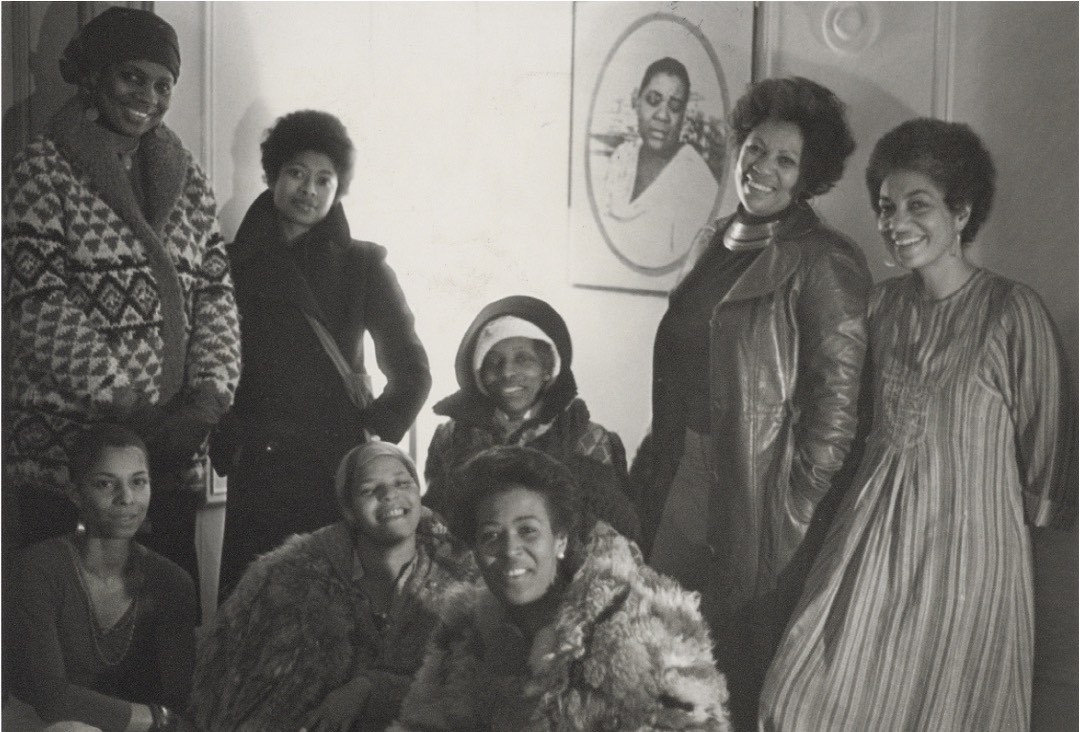125. Phenomenal Woman: The Black Women’s Literary Renaissance
Toni Morrison, Alice Walker, and Maya Angelou explore the themes of black feminism (or “womanism”) in their fiction.
Warning: this episode contains discussion of sexual violence and suicide.
Themes:
• M. Angelou, I Know Why the Caged Bird Sings (New York: 1969).
• M. Angelou, Gather Together in My Name (New York: 1974).
• M. Angelou, Singin' and Swingin' and Gettin' Merry Like Christmas (New York: 1976).
• M. Angelou, The Heart of a Woman (New York: 1981).
• M. Angelou, All God's Children Need Travelling Shoes (New York: 1986).
• M. Angelou, A Song Flung Up To Heaven (New York: 2002).
• J.M. Elliot (ed.), Conversations With Maya Angelou (Jackson: 1989).
• T. Morrison, The Bluest Eye (New York:1970).
• T. Morrison, Beloved (New York: 1987).
• T. Morrison, Playing in the Dark: Whiteness and the Literary Imagination (Cambridge: 1992).
• T. Morrison, What Moves at the Margin: Selected Nonfiction, ed. C.C. Denard (Jackson: 2008).
• T. Morrison, The Source of Self-Regard: Essays, Speeches, Meditations
• A. Walker, Once
• A. Walker, The Third Life of Grange Copeland
• A. Walker, Meridian (New York: 1976).
• A. Walker, The Color Purple (New York: 1982).
• A. Walker, In Search of Our Mother's Gardens: Womanist Prose
• A. Walker, The Same River Twice: Honoring the Difficult
---
• L. Balfour, "Toni Morrison and the Fugitives' Democracy," in M.L. Rogers and J. Turner (eds), African American Political Thought: A Collected History (Chicago: 2021), 541-562.
• B.W. Bell, The Afro-American Novel and Its Tradition (Amherst: 1987), chapter 7.
• T.M. Davis, Understanding Alice Walker
• C. Hudson-Weems, Africana Womanism: Reclaiming Ourselves (Troy: 1995).
• C. Johnson, Being & Race: Black Writing Since 1970 (Bloomington: 1988).
• J. McWhorter, "Saint Maya," The New Republic 226 (2002), 35-41.
• L.P. Howard (ed.), Alice Walker and Zora Neale Hurston: The Common Bond (Westport: 1993).
• S. Russell, Render Me My Song: African-American Women Writers from Slavery to the Present (New York: 1990).






Comments
17 Books!
Hello Peter,
Saw your tweet regarding the planned size of the HoP book series. Besides the upcoming Africana, Reformation, Classical China, and 18th century Western volumes, what other future books do you plan on publishing for the series? Do you see yourself potentially moving beyond 17 titles?
In reply to 17 Books! by Jack
17 books
Well that was a sort of back of the napkin calculation. What I was thinking was:
Already existing: 1. Classical 2. Hellenistic/Roman 3. Islamic World 4. Medieval 5. Classical Indian 6. Byzantium/Renaissance
In the works: 7. Africana up to 1900 8. Africana 20th c 9. Reformation
Future for European: 10. Early Modern (= 1600-1800): France and Netherlands 11. Early Modern: British Isles (also early USA) 12. Early Modern: Germany and Eastern Europe 13: 19th century
Future for non-European: 14. Classical China 15. Later India 16. Later China (with Korea and Japan?) 17. Philosophy in the Americas
So you can see there is room for more volumes here, e.g. Korea and Japan may need a separate volume; it is unrealistic to cover the 19th century in just one book, but I have simply no idea yet how I would organize that material yet; and uncertain is whether I would press on to the 20th century. So this is more like a bare minimum, if I did everything I want to do in non-European traditions at least.
In reply to 17 books by Peter Adamson
Tibetan Philosophy?
Will you not be covering Tibetan Philosophy as as extension to Later Indian Philosophy or as a separate series? Tibetan thought is much richer than Korean philosophy for example.
In reply to Tibetan Philosophy? by dukeofethereal
Tibet
I think I would absolutely need to integrate Tibet into the later China series, because it is so closely related to the spread of Buddhism there (even the preservation of the texts).
In reply to Tibet by Peter Adamson
Will Karyn lai continue for Later China?
Since Karyn Lai expertise is around classical China, can we presume she will not remain for post-Classical Chinese Philosophy ? Likewise will Ganeri remain to come back to cover Indian Philosophy post Dignaga? It would be a shame if later Indian thought does not get covered, it would feel incomplete, especially when you are close to completing Africana philosophy which so far has already double the amount of episodes of Indian.
In reply to Will Karyn lai continue for Later China? by dukeofethereal
Later contributors
I think it's unlikely in Karyn's case since as you say she is a classical period expert; Jonardon would be more of a possibility and he's the first person I'd ask. But we haven't talked about it concretely yet since it is a distant prospect for the time being. I agree that it would be very good to have a second India series of the same size as the first, roughly, to finish the story we started.
In reply to Tibet by Peter Adamson
I think Tibet should be…
I think Tibet should be covered together with later India, as Tibet's greatest influence is India.. But yes, its greatest impact is on china. For that reason I've always thought that India must be covered to completion before china begins.
Maybe an intermediate way can be found: After classical china finishes, we can return back and do later India. And only after that, we do later china.
As for Korean thought, not much information is available about it. I think it should be approximately as rich as the Japanese thought. Actually, if we consider the flow of ideas, Korea influenced Japan, and not vice versa. So it would be very valuable if hopwag lifts the curtain and introduces Korea to us, dedicated listeners, albeit in a very summary way..
In reply to 17 books by Peter Adamson
Russia, later Greek and other stuff
Just a random thought - where would Russia fit on this list (on what you plan to cover in the podcast series and as potential books)? Would it fit in the european or non european section? This question is going to come increasingly important as we get to the modern era, where the interaction philosophically between what we would definitely call Europe and the Russian Empire interact (I am primarily thinking of Peter the Great and Catherine the Great as shining examples of this modern interaction). Plus, and admittedly I know nothing about this, but after a quick google search wikipedia mentions that there was some debatable stuff in 11th-13th century and then some more certain stuff from Russian scribes onward until the 17th century that to be quite honest reads a little like it will be a semi repeat of some of the stuff covered in the medieval series about the relation of church and state, and church possessions and decorations, plus something about important educational institutions being formed for the origin of Russian philosophy. I know, very rigorous, but it does show that there is a potential story to be told if the pre modern stuff doesn't fall under European philosophy (which if did your rule about not going backwards to fill in gaps would probably apply).
Also, if I am going to go off of the logic of "if there is a wikipedia page for it then there should be a potential independent (to some extent anyway) story to be told", there is also the options to cover Vietnam and Indonesia (covering Indonesia qua Indonesia would be a good chance to cover some of the Islamic stuff you self admittedly missed in the Islamic world series.
As a final thing - would there be any plan of continuing where you ended with the Byzantine series? You did have an episode called "Later Orthodox" but overview episodes don't close the door for covering later stuff (if that was so, later India would also be closed off). Part of me guesses that, if anything, it would be part of the European series I guess.
I feel the need to say I am just sharing some ideas and this isn't me expecting all of that. All of the stuff you have covered already has been amazing and covering even a tenth of the stuff you plan on covering would be amazing by itself, putting aside the question of even if you will get around to all the planned stuff not to mention the 20th century. I'm just offering some more stuff for potential consideration, assuming time allows for any of it.
In reply to Russia, later Greek and other stuff by Andrew
Russia etc
Yes, I actually had thought about that: I would want to cover Eastern Europe and Russia when doing Early Modern: Germany. That is actually shorthand for central, eastern, and maybe even northern Europe. Though there may be limits how many rabbit holes I can go down. I am wondering whether to do a "later orthodox" style episode on Italy and Spain in the 17-18th centuries when I wrap up the Counterreformation, since I don't know where else to put that and I guess that these are not too prominent in the history of early modern philosophy... but there may be too much to cover there. Vico for instance should get his own episode, or more than one. Maybe he goes in with Early Modern: France. Oof, this is going to be hard isn't it!
I'd also wondered about Vietnam etc; I suspect that I will not manage to get that in just for the sake of telling a more or less coherent story, but perhaps sketchy coverage (a couple of episodes) would be better than none at all.
In reply to Russia etc by Peter Adamson
Wouldn't Iberia fall under France/Netherlands?
Given the low countries became independent of Spain (80 year war), wouldn't it be easier to list Iberian philosophers under France/Netherlands section of 1600-1800. As an extension, Italian philosophers could be included due to their catholic background and connections with the Iberians. So Perhaps rename the period to 'France, Iberia, Italy and the Low countries'.
In reply to Russia etc by Peter Adamson
So would that include pre…
So would that include pre modern russian philosophy in the Early Modern: Germany section? Or most likely just be skipped over?
Part of me wonders the usefulness of categorising based on region, not that I have a better suggestion, given the ambiguities like Vico. Ironic, given we are nearing the birth of the modern concept of the nation that using the very concept as an organising principle is actually quite difficult!
Now I have to wonder though - why Japan and/or Korea take priority over Vietnam and/or Indonesia? Just curious.
In reply to So would that include pre… by Andrew
Regions
Right there is a bigger issue here about how to divide up the material, and I have talked to a number of experts about my idea of doing it by region. Generally the feeling seems to be that this is as good as any other method though it does have problems (a big one is figures moving back and forth across boundaries, also transmission of ideas - the "republic of letters"). So I'll have to discuss those phenomena, cutting against the grain of my own organizational decision a bit.
Re. Russia and actually Eastern Europe more generally, I would do the earlier stuff first as background I think.
And why Japan and Korea? Good question, I can't actually give you a good reason why they would outrank Vietnam at the moment apart from saying that there seems to be more available literature on them, which for me as someone accessing these traditions from outside linguistically, would be vital of course. Might be wrong about this though, and as I say I would try to look into it when the time comes. But this is all very speculative, as we need to tackle Classical China first!
In reply to 17 books by Peter Adamson
Philosophy in the Americas
Thank you for the detailed reply! Will Philosophy in the Americas only cover Indigenous philosophical traditions and beliefs or will it also include non-native thinkers from the region as well?
In reply to Philosophy in the Americas by Jack
Americas
Well my sketchy idea was to cover Native American traditions, also Mesoamerican (Aztec, Inca, Maya) and then look at the advent of colonialism (which of course is the context for our written record of the Mesoamerican stuff) and follow Latinx philosophy up to... some point, maybe 1900 or all the way through the 20th c to match what we did in Africana. In general this series would have a lot in common structurally and perhaps conceptually with Africana. I think it would be challenging but really worthwhile, in part because no one has tried to bring all that material together before. (One advantage I would have here which I often don't with the non-European traditions: I can read Spanish! Though not Portuguese.)
Approximately how many…
Approximately how many episodes are left in this Africana series? I really hope to move to China as quickly as possible...
In reply to Approximately how many… by mehmet
Transition to China
China is not far off now, it should be starting in very early 2024.
Philosophy of Jazz
I just finished three spring semester courses on all of Morrison's novels (Early, Middle, and Late Novels), so it's great to see her taken up here in the African series.
With "St. Thomas" starting all the episodes, I keep wondering if you'll have an episode on the philosophy of jazz. The Sun Ra episode was splendid, but it was more Afro-Futurism than jazz.
In reply to Philosophy of Jazz by Andrew Shields
Jazz
True, that would have been a good idea for an episode - we did do more music than anyone might have expected though! I guess Sun Ra is as close as we'll get to covering it.
Add new comment